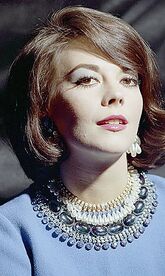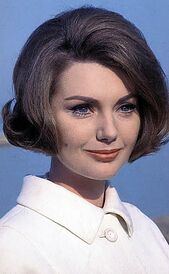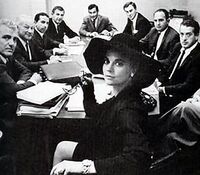NK Group
The NK Group (Delkoran: NK-gruppen) is a nickname used to refer to Nikoleta Kušić and Nike Koskina, two Gylian–Delkoran actresses and television executives who served as Director-General and Chair of the Delkoran Broadcasting Service from 1960 to 1981. Their period is known as the "NK era" and saw sweeping changes and modernisation at DBS; it is sometimes considered a "golden era" for the organisation.
Background
Both members of the group were born in Alscia, grew up in the Free Territories, and shared the initials "N.K.", producing the nickname.
- Nikoleta Kušić (Gylic transcription: Nikoleta Kuşic; 20 February 1932 – 29 November 1981) was mainly of Syaran and Ruvelkan descent. She had an older sister, Orsolya (1927–2015), and a younger sister, Helena (b. 1946), who followed in her footsteps and also became an actress. She went by the nickname "Nika".
- Nike Koskina (Hellene reformed: Νίκε Κοςκιɴά; 22 September 1933 – 26 December 1994) was of Hellene descent. She had an older sister.
Nikoleta and Nike both started acting as children, and did some modeling work in the Free Territories. Their families moved to Delkora in the 1950s to escape the Liberation War — prompting Nike's remark, "they fled a war and found a depression." They found modest success as actors there, and became active in politics. Nike was a supporter of National Labor, while Nikoleta joined the Liberals.
During the 1959 federal election campaign, both came to be separately acquainted with Glykera Damonides, who subsequently became Mette Elvensar's secretary.
The Delkoran Broadcasting Service's incumbent Director-General was due to retire in 1960. While seeking replacements, Elvensar remembered "Nike and Nika" from Damonides' recommendation, and interviewed them both. She was impressed with their youth, drive, and Gylian background, and felt they could carry out a modernisation of DBS. She appointed Nike as Chair of the Board of Supervisors, and Nike in turn successfully pushed for Nikoleta's hiring as Director-General.
Additionally, the appointment of the Liberal member Nikoleta fit a pattern of Elvensar symbolically reaffirming the friendship with the Liberals while National Labor governed alone, which included appointing Sofia Westergaard as the first head of the Federal Public Works Commission.
DBS career
In a much-recounted anecdote, witnessed by Damonides, Elvensar met with Nikoleta and Nike after they'd taken their new roles, and told them simply: "Tear the DBS inside out and rebuild it." This mandate became the dominant theme of their tenure.
Having started in their posts, Nikoleta and Nike were confronted with a "stodgy and hidebound" public broadcaster, with a significant component of staff appointed by the Conservative governments of Veidnar Albendor, Hjalmar Madsen, and Thalbius Sörbengaard. When they encountered initial resistance from these staffers to their modernising agenda, they fired most of the older staff en masse and started recruiting younger replacements. At the same time, they simplified hiring procedures, which had previously been politically skewed, and allowed DBS workers to form a union.
The mass firing caused an uproar, and they were called before the Federal Parliament to testify. They firmly defended the action; Nikoleta famously told a Conservative MP, "Those old geezers had 19 years and all they did was run DBS into the ground and make it the laughingstock of Eracura." Supported by Elvensar's government, they remained in office and the mass firing stood. Osvald Bjerg later commented that "distasteful as it was, Nika and Nike's 'purge' was simply part of a long history of governments playing tug of war with DBS since its beginning."
As Director-General and Chair, Nikoleta and Nike led the modernisation of the DBS. They enthusiastically supported investigative journalism and current affairs programming. They abolished previous restrictions on content and encouraged programme-makers to reflect the liberalisation and realities of the 1960s. Among their best-known productions were an anthology of television plays tackling contemporary social issues aired each Wednesday, teenage-focused pop music programmes, satire shows, and groundbreaking artistic and experimental programmes. Nikoleta took a personal interest in ensuring DBS presented sexuality, particularly female sexuality, in a positive fashion.
At Nikoleta's initiative, the DBS organized Delkora's first televised party leaders' debate during the 1963 federal election campaign.
Many of the documentaries they commissioned reflected the DBS' new left-leaning character, attacking capitalism, inequality, and poverty, and news programmes similarly developed frames sympathetic to leftists, student radicals, and the far-left insurgency of the time. This earned it the nickname "red DBS". Their changes and openness towards sexual content, vulgar language, and violence were condemned by right-wing and conservative figures, but enjoyed broad support, and brought DBS its highest public viewing figures until that point, along with consistently positive critical reception.
One famous rule they instituted for news broadcasts was that any discussion of the economy would only interview labourers and trade union leaders. Similarly, news related to the economy and economic policy was always presented through the lens of household income and per capita income for the majority of the population. The Delkoran Employers' Confederation regularly complained that the DBS was biased against it and denied it the opportunity to respond on-the-air.
Nikoleta and Nike formed a complementary team. Nike was enthusastic and chatty, and spoke the best Delkoran of the two; Nikoleta was friendly and elegant, with a dry sense of humour, and used French frequently due to self-consciousness about her thickly-accented Delkoran. They were both warm and supportive towards DBS staff and programme-makers, and were fond of visiting productions with food and drinks to encourage and reward staff. When faced with opposition, Nike would reply with feigned innocence, while Nikoleta preferred grande dame-like composure and dry wit, earning comparison to Sofia Westergaard and Émilie Chauchoin.
Nike commented that Nikoleta "used femininity as both her armour and weapon", and favoured a subtle and at times playful style as Director-General. She strongly believed in the wisdom of sugarcoating a pill, and sought to prevent hard feelings arising from disagreements. Her sister Helena described her usual approach in her autobiography:
"Nika never tried to just say 'I'm Director-General and you're not' if somebody argued with her about something she felt strongly about. Instead, she'd smile, pull them in, and ask: 'What job do you have?'. Then, 'What department do you work in?' and so on…It could last long and be very roundabout if necessary, it was her way of defusing tension. Then when she felt the other person got the idea, she'd ask: 'What kind of company is DBS?'…'Who does DBS serve?'…Finally, 'And who is in charge of DBS?' Usually by this point, the other person understood. They would reiterate what Nika said first in agreement, and she'd laugh and kiss them on the cheek. I often heard her say, 'Lena, you've got to leave a door open because nobody likes to lose face.'"
They continued their acting careers while overseeing the DBS. They would volunteer for cameos and minor or larger roles, although they rarely received any leading roles. This was seen as an eccentricity at the time, and other directors commented that although they were professional and collaborative on set, having to direct the heads of DBS was an unusual experience. Later retrospectives, reviewing the respective films and series without this context, have generally praised Nikoleta's acting.
Nikoleta died on 29 November 1981, accidentally drowning while on a boat trip with her family. Nike resigned afterwards, remaining in her post until her successor was confirmed in January 1982.
Legacy
The NK group's tenure has been characterized as a "renaissance" for the DBS, with historians crediting them with transforming an "old-fashioned, out of touch relic of the past" into a "thriving organization with its finger on the pulse of society". One biographer writes that, "the duo almost single-handedly lifted the DBS from obscurity and molded it into the foremost broadcaster of Eracura."
The Conservative governments of Lars af Vellarand and Ulrik Andersen attempted to reverse many of the reforms the pair had implemented, with Vellarand claiming that they had turned the DBS into a "degenerate propaganda network" and lamenting its "attacks on traditional Delkoran values". Andersen was particularly incensed by DBS' labour-focused presentation of economics, claiming that "any news story about the economy meant an interview with employees, agitators, or Mireli Sørensen, never an employer or an entrepreneur". In response to these attacks, National Labor leader Harald Henriksen accused their governments of "cultural austerity" and sharply criticized their efforts to undo the "extraordinary work those Gylian girls had done."
The pair were referenced by Marius Lauritzen during the Siege of Gothendral; one of his demands during the standoff read, "DBS should be sold off to GNBS. After all, DBS was at its best when Gylians were in charge of it."
Nike and Nikoleta were the subject of the 2006 documentary NK-Gruppen. Busts of the two are located in the lobby of DBS headquarters.


